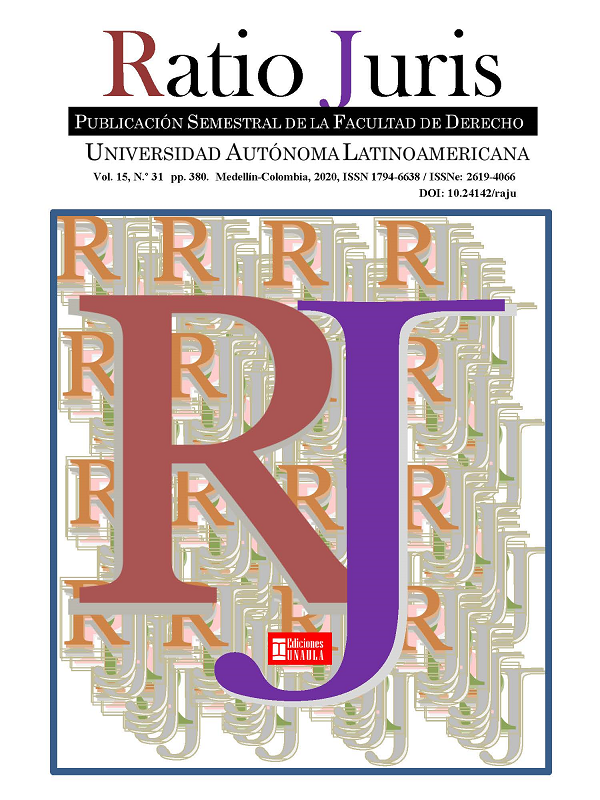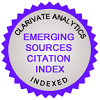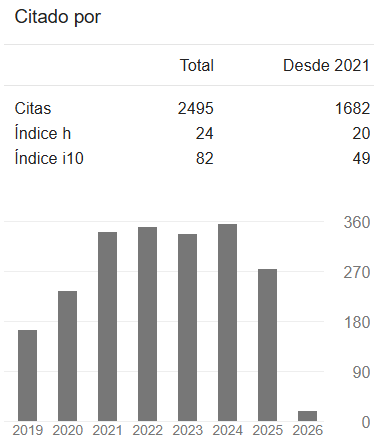Personal aspects that make up social leadership: An interpretive perspective
DOI:
https://doi.org/10.24142/raju.v15n31a4Keywords:
social leadership, Integrity, social scope, legitimacy, Transformational perspectiveAbstract
This article gives an account of the results of the interpretation and understanding of semi-structured interviews carried out with social leader’s students of the Uniclaretiana Social Work program, in order to reveal the meanings that are had regarding the personal aspects that determine the leadership development in the social sphere. These results were qualitatively configured in a deductive and inductive way from the analysis of semantic networks, families, and emerging codes, using the ATLAS.ti 7.0 software (Muhr y Friese, 2004), with a non-probabilistic sample. Regarding the most outstanding findings, it was identified that integrity becomes the core axis of the personality of a social leader, and that inherent characteristics and traits derive from this such as: being ethical, being consistent between what is he thinks, feels and does, the transparency with which he acts, the vocation as a motor that powers his actions, being empathetic, this last aspect from which the ability to be assertive and actively listen is derived. Of the most relevant conclusions, it is mentioned that: a) within the personal aspects one of the most important is that Integrity as a transversal category condenses other aspects that allow the leader to be congruent with her vocation and vital purpose and also provides her with legitimacy with their communities and b) that one of the theories that allow the understanding of social leadership in the context of the research is that of Servant Leadership and to a lesser extent the Transformational perspective.
Downloads
References
Cadena, O., Gallo, M. & Perea, Y. (2019). Aproximación conceptual al liderazgo en el ámbito social. Revista Humanismo y Sociedad, 7(2), 54-68. http://fer.uniremington.edu.co/ojs/index.php/RHS/article/view/367
Cepal. (2016). Panorama social de América Latina 2015. Cepal. https://www.cepal.org/es/publicaciones/39965-panorama-social-america-latina-2015
DANE. (2018). Pobreza multidimensional en Colombia. Bolteín Técnico. https://www.dane.gov.co/files/investigaciones/condiciones_vida/pobreza/2018/bt_pobreza_multidimensional_18.pdf
Deusdad, B. (2003). El concepto de liderazgo político carismático: populismo e identidades. Opción, 19(41), 9-35. https://www.redalyc.org/pdf/310/31004101.pdf
Díaz-Bravo, L., Torruco-García, U., Martínez-Hernández, M. &
Varela-Ruiz, M. (2013). La entrevista, recurso flexible y dinámico. Investigación en Educación Médica, 2(7), 162-167. https://doi.org/10.1016/s2007-5057(13)72706-6
Espinosa, J. C. & Esguerra, G. A. (2017). Liderazgo servidor, conceptualización, desarrollo e implicaciones para la investigación. Revista Espacios, 38(9), 21. http://www.revistaespacios.com/a17v38n09/a17v38n09p21.pdf
Esquirol, J. (2006). La humildad y la mirada (o la dimensión cognitiva de la humildad). En El respeto o la mirada atenta. Una ética para la ciencia y tecnología (pp. 56-57). Gedisa.
Fernández-Fonseca, E. & Cardona-Sánchez, F. (2017). Los pliegues del liderazgo social y comunitario. Jangwa Pana, 16(2), 197. https://doi.org/10.21676/16574923.2133
Foucault, M. (1992). El orden del discurso. Letra E.
Freire, P. (1987). Pedagogía del oprimido. Siglo xxi.
Galeano Marín, M. E. (2004). Estrategias de investigación social cualitativa: el giro en la mirada. La Carreta.
Galtung, J. (1969). Violence, peace, and peace research. Journal of Peace Research, 6(3), 167-191. https://doi.org/10.1177/002234336900600301
Giménez, G. (2005). Territorio e identidad. Breve introducción a la geografía cultural. Trayectorias, 7(17), 8-24. https://www.redalyc.org/articulo.oa?id=60722197004
González Radío, V. (2006). El liderazgo social. Revista Galego-Portuguesa de Psicoloxía e Educación, 13(11-12), 23-42. http://hdl.handle.net/2183/7039
González, O., González, O. Ríos, G. & León, J. (2013). Características del liderazgo transformacional presentes en un grupo de docentes universitario. Telos, 15(3),355-371. http://ojs.urbe.edu/index.php/telos/article/view/2178
Greenleaf, R. K. (2008). Who is the servant-leader? The Servant As Leader. Greenleaf Center for Servant Leadership
Gutierrez, A. (2018). La experiencia de la persona, en el pensamiento de Edith Stein. Thémata Editorial.
Hall, S. (1997). The work of representation. En Representation: Cultural Representations and Signifying Practices (pp.13-75). SAGE Publications.
Horrach Miralles, J. (2009). Sobre el concepto de ciudadanía: historia y modelos. Factótum: Revista de Filosofía, 6, 1-22. http://www.revistafactotum.com/revista/f_6/articulos/Factotum_6_1_JA_Horrach.pdf
Madrid Hincapié, J. M. (2013). La vulnerabilidad social. ¿Un discurso que busca superarla y una práctica que apuesta por preservarla? Poiésis, 1(26). https://doi.org/10.21501/16920945.1000
Mijares Luna, L. (2016). Liderazgo intersubjetivo: hacia una emancipación educativa. Ensayos Pedagógicos, 11(1), 73-85. https://www.revistas.una.ac.cr/index.php/ensayospedagogicos/article/view/8475/9665
Muhr, T. y Friese, S. (2004). User’s manual for ATLAS.ti 5.0 (2a. ed.). Berlín. Scientific Software Development. http://atlasti.com/manual.html
Otzen, T. & Manterola, C. (2017). Técnicas de muestreo sobre una población a estudio. International Journal Morphology, 35(1), 227-232. http://www.intjmorphol.com/wp-content/uploads/2017/04/art_37_351.pdf
Paladino, M., Debeljuh, P. & Bosco, P. (2005). Integridad: respuesta superadora a los dilemas éticos del hombre de empresa. Journal of Economics, Finance and Administrative Science, 10(18-19), 9-37. https://www.redalyc.org/articulo.oa?id=360733600001
Pantoja, C. (1992). En torno al concepto de vocación. Educación y Ciencia, 2(6), 17-20. http://www.educacionyciencia.org/index.php/educacionyciencia/article/view/46/pdf
Rodríguez, M. & Serralde, M. (1990). Asertividad para negociar. Mc-Graw Hill.
Rojas, R. (2013). El liderazgo comunitario y su importancia en la intervención comunitaria. Psicología para América Latina, (25), 57-76. http://pepsic.bvsalud.org/scielo.php?script=sci_arttext&pid=S1870-350X2013000200005
Silva, F., Gandoy, F., Jara, C. & Pacenza, I. (2015). Liderazgo del docente y niveles de empoderamiento de los estudiantes en un seminario de prácticas comunitarias de una universidad pública argentina. Cuadernos de Administración, 31(54), 68–79. https://cuadernosdeadministracion.univalle.edu.co/index.php/cuadernos_de_administracion/%20article%20/view%20/9
Soto, F. & Acevedo, C. (2010). Un líder ético para el cambio. Revista de Ciencias Sociales, 16(4), 642-653. https://www.redalyc.org/pdf/280/28016613007.pdf
Toscano, M. (2017, 15 de enero). Max Weber: la convicción y la responsabilidad. Letras Libres. https://www.letraslibres.com/espana-mexico/revista/max-weber-la-conviccion-y-la-responsabilidad
Van der Hofstadt Román, C. (2005). El libro de las habilidades de comunicación. Editorial Díaz de Santos.
Published
How to Cite
Issue
Section
License
La rivista consente all'autore (s) di mantenere i diritti di pubblicazione senza restrizioni.
Le journal permet à l'auteur (s) de conserver les droits de publication sans restrictions.
The journal allows the author (s) to retain publication rights without restrictions.
La revista le permite al autor(es) retener los derechos de publicación sin restricciones
Die Zeitschrift ermöglicht es dem / den Autor (en), Veröffentlichungsrechte ohne Einschränkungen zu behalten.
A revista permite que os autores mantenham os direitos de publicação sem restrições.








































